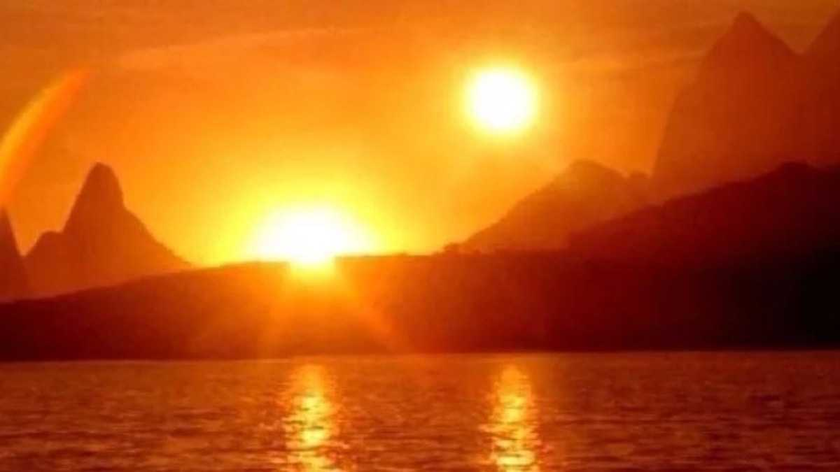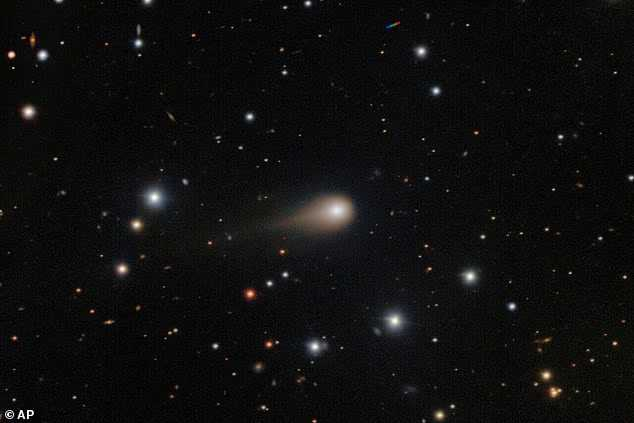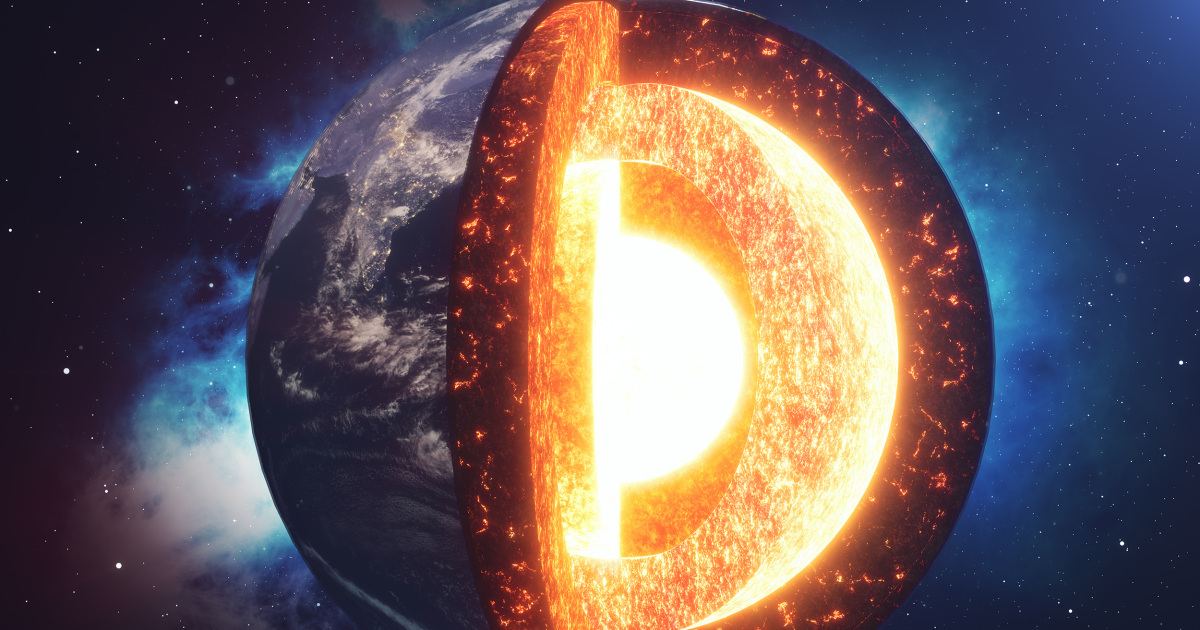It has been written with names as samvartaka fire, frashokereti, ekpyrosis, and yuga fire.
Primarily ... Snippets from the Mahabhrata. We are at the end of Kali Yuga.
Samvartaka Fire / Two Suns / End Of The Yuga
Two Suns
https://www.youtube.com/watch?v=GknwOu8C_B0
I launched with the might of my arms and in wrath with mantras, the great powerful discus Sudarsana which reduceth to ashes in battle Yakshas and Rakshasas and Danavas and kings born in impure tribes, sharp-edged like the razor, and without stain, like unto Yama the destroyer, and incomparable, and which killeth enemies. And rising into the sky, it seemed like a second sun of exceeding effulgence at the END OF THE YUGA.
And the god of justice, of inconceivable soul, the son of Surya (Sirius), the destroyer of all creatures, with the mace in hand, came there on his car, illuminating the three worlds with regions of the Guhyakas, the Gandharvas and the Nagas, like a second Surya (Sirius) as he riseth at the END OF THE YUGA - Mahabharata
"7. Behold, oh Lanoo ! The radiant child of the two, the unparalleled refulgent glory : Bright Space Son of Dark Space, which emerges from the depths of the great dark waters. It is Oeaohoo the younger, the * He shines forth as the son ; he is the blazing Divine Dragon of Wisdom ; Secret Doctrine, Vol 1 pg 29
Two Suns - See also >>> https://ontheroadtofindout.locals.com/post/1856886/sirius-oeaohoo-the-younger-two-suns-three-fish-pt7
END OF THE YUGA
The illustrious chief of the Kurus then hurled with great force at the king of the Madras that blazing dart of beautiful and fierce handle and effulgent with gems and corals. All the Kauravas beheld that blazing dart emitting sparks of fire as it coursed through the welkin after having been hurled with great force, even like a large meteor falling from the skies at the END OF THE YUGA.
The energy of the Supreme Lord looked like the Samvartaka fire which destroys all creatures at the END OF THE YUGA.
Thou art that puissant Lord who didst create Rudra when the END OF THE YUGA came and when the Creation was once more to be dissolved. That Rudra, who sprang from thee destroyed the Creation with all its mobile and immobile beings, assuming the form of Kala of great energy, of the cloud Samvartaka (charged with water which myriads of oceans are not capacious enough to bear), and of the all consuming fire. Verily,
pg 1371 "These fair ladies, in successive bevies, O king, came out, filled with sorrow, and ran hither and thither like a herd of fillies on a circus yard. Seizing each other by the hand, they uttered loud wails after their sons and brothers and sires. They seemed to exhibit the scene that takes place on the occasion of the universal destruction at the END OF THE YUGA. Weeping and crying and running hither and thither, and deprived of their senses by grief, they knew not what to do. Those ladies who formerly felt the blush of modesty in the presence of even companions of their own sex, now felt no blush of shame, though scantily clad, in appearing before their mothers-in-law. Formerly they used to comfort each other while afflicted with even slight causes of woe. Stupefied by grief, they now, O king, refrained from even casting their eyes upon each other. Surrounded by those thousands of wailing ladies, the king cheerlessly issued out of the city and proceeded with speed towards the field of battle. Artisans and traders and Vaishyas and all kinds of mechanics, issuing out of the city, followed in the wake of the king. As those ladies, afflicted by the wholesale destruction that had overtaken the Kurus, cried in sorrow, a loud wail arose from among them that seemed to pierce all the worlds. All creatures that heard that wail thought that the hour of universal destruction had come when all things would be consumed by the fire that arises at the END OF THE YUGA.
O scorcher of foes, that the entire universe rests on Vishnu. O thou of mighty arms, it is He who creates all creatures mobile and immobile."
Possessed of many eyes, that vanquisher of all foes, that Lord of even the gods of all gods, suddenly arose from within the pit in which was kept the sacrificial fire. Possessed of the effulgence of a thousand Suns, and looking like another Samvartaka"
Mahadeva shone like the lord of stars while he is at his full. The fire born of his energy resembled in effulgence the lightening that flashes amid clouds. Verily, it seemed as if a thousand suns rose there, filling every side with a dazzling splendour. The energy of the Supreme Lord looked like the Samvartaka fire which destroys all creatures at the END OF THE YUGA.
Whilst consuming that Rakshasa force, Drona's son in that battle shone resplendent like the Samvartaka fire, while burning all creatures at the END OF THE YUGA. Indeed, amongst those thousands of kings and those Pandavas, O Bharata, ...
Thou art the auxiliary and thou art the adversary, and thou art the destroyer of both auxiliaries and adversaries. Thou art the time when clouds appear, thou art of large teeth, and thou art Samvartaka and Valahaka.[1424] Thou art manifest in the form of splendour. Thou art concealed in consequence of being invested with Maya (or illusion). Thou art He who connects creatures with the fruits of their acts. Thou hast a bell in thy hand. Thou playest with all mobile and immobile things (as with thy toys). Thou art the cause of all causes.
1424. Meghakala is the time when clouds appear, i.e., the time of the universal deluge. Samvartaka and Valahaka are the two clouds that appear on the occasion of the universal destruction.
When the words of wisdom spoken by friends and which are even as fit regimen are not listened to, but on the other hand temptation is on the increase, a frightful and universal destruction is sure to overtake all the Kurus."
"And Astika said, 'Thou best of snakes, it behoveth thee not to grieve any longer. I shall dispel this fear of thine from the blazing fire. This terrible punishment, capable of burning like the fire at the END OF THE YUGA, I shall extinguish. Nurse not thy fear any longer.'
"O Brahmana, thus I have recited the names of the principal snakes known widely for their achievements--I have not been able to name all, the number being countless. The sons of these snakes, the sons of those sons, that were burnt having fallen into the fire, I am unable to mention. They are so many! Some of three heads, some of seven, others of ten, of poison like unto the fire at the END OF THE YUGA and terrible in form,--they were burnt by thousands!
"Meanwhile, Phalguna, impelled by the desire of doing good unto Bharadwaja's son, assailed the son of Prishata with a shower of arrows and felled him from the elephant on which he was seated. And, O monarch, Arjuna, like unto the terrible fire that consumeth all things at the END OF THE YUGA
"Vaisampayana continued, 'Thus addressed both by Dasarha and Arjuna, the illustrious god then put forth his most energetic form, and prepared to consume the forest. Surrounding it on all sides with his seven flames, he began to consume the forest of Khandava, exhibiting his all-consuming form like that at the END OF THE YUGA (cycle).
When Bhimasena began to grind his teeth in rage, the monarchs beheld his face resembling that of Death himself, at the END OF THE YUGA, prepared to swallow every creature. And as the hero endued with great energy of mind was about to leap up impetuously, the mighty-armed Bhishma caught him like Mahadeva seizing Mahasena (the celestial generalissimo).
O thou who knowest no deterioration, all the Rishis, coming unto thee seated in thy glory on the sacrificial ground, seek protection of thee! And, O slayer of Madhu, thou stayest at the END OF THE YUGA, contracting all things and withdrawing this universe into thy own self, thou repressor of all foes!
"O holder of the trident, thou art the refuge of the celestials and the Asuras, of, indeed, the universe. By thee have been created the three worlds with their mobile and immobile beings. It is thou again that swallowest everything at the END OF THE YUGA.
This Arjuna, O king, though possessed of two hands, is equal, for the lightness of his hand in discharging shafts, to (Kartavirya) Arjuna of a thousand arms! He Is even (to foes), like unto Yama himself at the END OF THE YUGA!
"Arjuna said, 'O illustrious god having the bull for thy sign, if thou wilt grant me my desire, I ask of thee, O lord that fierce celestial weapon wielded by thee and called Brahmasira--that weapon of terrific prowess which destroyeth, at the END OF THE YUGA the entire universe--that weapon by the help of which, O god of gods, I may under thy grace, obtain victory in the terrible conflict which shall take place between myself (on one side), and Karna and Bhishma and Kripa and Drona (on the other)-
The dust of the battle-field is its smoke. Urged by the sons of Dhritarashtra even as the wind urgeth the fire, Karna like unto the all-consuming fire at the END OF THE YUGA that is sent by Death himself, will, without doubt, consume my troops like unto a heap of straw.
"Behold, I too am as much stricken with grief as thou. I think this universal destruction has been brought about by the irresistible course of Time. Inevitable as it was, this dreadful slaughter has not been due to the voluntary agency of human beings"
Impulses of Animal Man in Black Time
Killing
"The first, most elementary and horrifying of all, is the innocent voraciousness of life, which feeds on lives and provides the first interest of the infant feeding on its mother. The peace of sleep shatters in nightmare into apparitions of the cannibal ogress, cannibal giant, or approaching crocodile, which are features, also, of the fairy tale. In Dionysiac orgies the culminating frenzies issue still, in some parts of the world, in the merciless group cannibalizing of living bulls. The most telling mythological image of this grim first premise of life is to be seen in the Hindu figure of the world-mother herself as KÃ¥læ, “Black Time,†licking up with her extended, long, red tongue the lives of all the living of this world of her creation. For, as noticed in a paper on “ritual killing†by the late director, Adolf E. Jensen, of the Frobenius Institute in Frankfurt-am-Main, “it is the common mark of all animal life that it can maintain itself only by destroying life;†citing to this point an Abyssinian song in celebration of the joys of life: “He who has not yet killed, shall kill. She who has not yet given birth shall bear.â€2
Sex
The second primal compulsion, linked almost in identity with the first (as recognized in this Abyssinian paean), is the sexual, generative urge, which during the years of passage out of infancy comes to knowledge with such urgency that in its seasons it overleaps the claims even of the first. For here the species talks. The individual is surpassed. In the quiver of the Hindu god Kåma, whose name means “desire†and “longing,†and who is a counterpart of Cupid — no child, however, but a splendid youth, emitting a fragrance of blossoms, dark and magnificent as an elephant stung with vehement desire — there are five flowered arrows to be sent flying from his flowery bow, and their names are “Open Up!†“Exciter of the Paroxysm of Desire,†“The Inflamer,†“The Parcher,†and “The Carrier of Death.†Orgies of whole companies overtaken by the released zeal of the arrows of this god are reported from every quarter of the globe.
Plunder
A third motivation, which has been the unique generator of the action on the stage of world history — since the period, at least, of Sargon I of Akkad, in southern Mesopotamia, c. 2300 BC — is the apparently irresistible impulse to plunder. Psychologically, this might perhaps be read as an extension of the bioenergetic command to feed upon and consume; however, the motivation here is not of any such primal biological urgency, but of an impulse launched from the eyes, not to consume, but to possess".
Myth and the Body, Joseph Campbell
Luk 21:25 And there shall be signs in the sun, and in the moon, and in the stars; and upon the earth distress of nations, with perplexity; the sea and the waves roaring;
Luk 21:26 Men's hearts failing them for fear, and for looking after those things which are coming on the earth: for the powers of heaven shall be shaken.
Luk 21:27 And then shall they see the Son of man coming in a cloud with power and great glory.
Luk 21:28 And when these things begin to come to pass, then look up, and lift up your heads; for your redemption draweth nigh.
Cyclical Events / Holy Roller / Horses / Balls / Trains / Nameless Messenger (3i/Atlas)
Black Cloud
"Arthur C. Clarke, a more consistent writer of good science fiction than Hoyle, although he only equaled Hoyle at his best, stated as his ‘Third Law’ that ‘any sufficiently advanced technology is indistinguishable from magic.’ The Black Cloud reinforces the message in spades. Pizarro fired his cannon, and was taken for a god by the Incas. Imagine if he had arrived in a helicopter gunship instead of on a horse. Imagine the response of a medieval peasant, or even aristocrat, to a telephone, a television, a laptop computer, a jumbo jet. The Black Cloud vividly conveys to us what it would be like to be visited by an extraterrestrial being whose intelligence would seem god-like from our lowly point of view. Indeed, Hoyle’s imagination far outperforms all religions known to me. Would such a super-intelligence then actually be a god?"
Richard Dawkins from Hoyle, Fred. The Black Cloud (p. 214).
Mystery Heavenly Body Discovered, a front page story
31-Dec-1983...
The brain is of strands and it is duplicated by your hair which is an extension of your brain and captures prana, the electricity of the air! The brain is an electromagnetic device which receives energy (emf) and transmits it into thoughts, images, smells, sounds etc. of the 5 senses. The hair captures prana and feeds the brain, which is why the hair comes out of your head. It is foolishness, to cut, dye or do anything that damages the hair on any part of your body, especially the head! IMO Cutting and dying hair is egotism (or cultural slavery) and is one of the greatest impediments to achieving higher consciousness through the collection of prana or Light!
Re-Discoveries of Science - Living on an Onion Planet
Deep inside Earth, scientists find weird blobs and mountains taller than Mount Everest
"Researchers such as Barbara Romanowicz at the University of California, Berkeley are using seismic (earthquake) waves to scan our planet’s innards, much like doctors use ultrasound to peer inside patients. What they’re seeing is full of complex detail — not a bland mineral hunk, but a rich and dynamic inner landscape.
The mantle appears to be layered like an onion, with major transitions 250 miles and 410 miles down. At the 410-mile level, researchers recently identified a tremendous interior mountain range, with peaks perhaps even taller than Mount Everest. “Recently, we’ve discovered another change at about 1,000 kilometers [600 miles] depth,” Romanowicz says."
https://www.nbcnews.com/mach/science/deep-inside-earth-scientists-find-weird-blobs-mountains-taller-mount-ncna997111



























